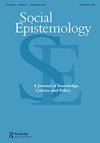阴谋论与民主合法性
IF 2
2区 哲学
Q1 HISTORY & PHILOSOPHY OF SCIENCE
引用次数: 5
摘要
阴谋论经常被描述为对民主的威胁,阴谋论者被描述为在认识上或道德上不合理。如果这些描述是正确的,那么源自阴谋论的原因可能会威胁到民主审议的合法化功能。在本文中,我将提出相反的观点。尽管一些阴谋论者提出了非同寻常的认识论和道德上不合理的主张,但对阴谋论的信仰是由信仰中固有的内在认识规范引导的。通过利用Cheryl Misak和Robert Talisse提出的皮尔斯认识论辩护的见解,我认为这些认识论规范隐含地将理论家承诺于一个开放的民主社会。本文章由计算机程序翻译,如有差异,请以英文原文为准。
Conspiracy Theories and Democratic Legitimacy
ABSTRACT Conspiracy theories are frequently described as a threat to democracy and conspiracy theorists portrayed as epistemically or morally unreasonable. If these characterizations are correct, then it may be the case that reasons stemming from conspiracy theorizing threaten the legitimizing function of democratic deliberation. In this paper, I will argue the opposite. Despite the extraordinary epistemic and morally unreasonable claims made by some conspiracy theorists, belief in conspiracy theories is guided by internal epistemic norms inherent in believing. By utilizing the insights of the Peircean epistemic defense formulated by Cheryl Misak and Robert Talisse, I take it that these epistemic norms implicitly commit the theorist to an open democratic society.
求助全文
通过发布文献求助,成功后即可免费获取论文全文。
去求助
来源期刊

Social Epistemology
Multiple-
CiteScore
2.60
自引率
17.60%
发文量
60
期刊介绍:
Social Epistemology provides a forum for philosophical and social scientific enquiry that incorporates the work of scholars from a variety of disciplines who share a concern with the production, assessment and validation of knowledge. The journal covers both empirical research into the origination and transmission of knowledge and normative considerations which arise as such research is implemented, serving as a guide for directing contemporary knowledge enterprises. Social Epistemology publishes "exchanges" which are the collective product of several contributors and take the form of critical syntheses, open peer commentaries interviews, applications, provocations, reviews and responses
 求助内容:
求助内容: 应助结果提醒方式:
应助结果提醒方式:


